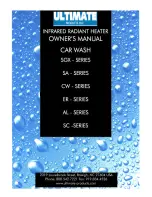
lp-441 Rev. 004 Rel. 000 Date 7.2.21
18
Part 5 - Venting
The heater must be vented as detailed in this section. Ensure exhaust
vent and intake piping complies with these instructions regarding
vent system. Inspect finished exhaust vent and intake piping
thoroughly to ensure all joints are well secured, airtight, and comply
with all applicable code requirements, as well as the instructions
provided in this manual. Failure to properly install the vent system
will result in severe personal injury or death.
A. General
This heater is certified as a “Category IV” appliance and requires a
special venting system. The vent system will operate with a positive
pressure in the pipe. Exhaust gases must be piped directly outdoors
using the vent materials and rules outlined in these instructions. Do
not connect vent connectors serving appliances vented by natural
draft into any portion of mechanical draft systems operating under
positive pressure. Follow the venting instructions carefully. Failure
to do so will result in substantial property damage, severe personal
injury, or death.
1. Installation should be made in accordance with the regulations of
the Authority Having Jurisdiction, local code authorities, and utility
companies which pertain to this type of water heating equipment.
2. Install the venting system in accordance with these instructions
and with the National Fuel Gas Code, ANSI Z223.1/NFPA 54, CAN/CGA
B149, and / or applicable provisions of local building codes.
3. This water heater must be vented with materials, components, and
systems listed and approved for Category IV appliances.
Exhaust and intake are to be piped separately. This heater cannot
share a common exhaust or intake with multiple appliances. Failure
to follow these instructions will result in substantial property
damage, severe personal injury, or death.
NOTE:
To avoid contamination often contained in indoor air, it is best
to pipe all intake combustion air directly to the outdoors.
NOTE:
Care must be taken to prevent condensate freezing in the
exhaust vent pipe system. See local, state, provincial, and national
codes for best practices to prevent condensate freezing in the exhaust
vent pipe system.
Improper seating of vent pipe gaskets can cause eventual gasket
failure and exhaust gas leakage. Ensure the exhaust vent pipe is
properly beveled and seated before insertion into the flue adapter.
Failure to do so could result in property damage, severe personal
injury, or death.
Due to the extreme flammability of most glues, cements, solvents,
and primers used to join plastic exhaust vent and intake pipes,
explosive solvent vapors must be cleared from all vent piping
before start-up. Avoid using excess cement or primer, as this may
pool in the vent pipes. Vent assemblies should be allowed to
cure for a period of at least 8 hours before powering a connected
appliance. Failure to follow these instructions will result in
substantial property damage, severe personal injury, or death. It is
the installers’ responsibility to understand the hazards associated
with explosive solvents and take the necessary precautions to
avoid these risks.
Exhaust vent adaptors are not designed as load-bearing devices,
and must not be used to support exhaust vent piping. All vent pipes
must be properly connected, supported, and the exhaust vent must
be pitched a minimum of 1/4” per foot back to the heater to allow
drainage of condensate. Failure to properly support vent piping
and follow the information in this statement could result in product
damage, severe personal injury, or death.
It is required to insert the provided exhaust and intake screens into
the vent terminations to prevent blockage caused by debris or birds.
Failure to keep terminations clear could result in property damage,
severe personal injury, or death.
• Only Stainless Steel exhaust vent pipe material may be
insulated.
• DO NOT insulate the first three (3)
linear feet of the exhaust vent run.
• DO NOT insulate PVC, CPVC, or
Polypropylene exhaust vent pipe
material. Doing so will cause
increased vent wall temperatures,
which could result in vent pipe
failure.
• CPVC, Polypropylene, or Stainless
Steel pipe material MUST be used
if the first three (3) linear feet
of the exhaust vent run passes
through an enclosed space greater than 6” in length, such as a
wall or ceiling.*
• If CPVC is used to meet these requirements, the balance may be
installed with approved PVC pipe.
• If Polypropylene or Stainless Steel is used to meet these
requirements, the balance of the vent run MUST be installed
with the same material.
• Failure to comply with these requirements could result in
property damage, severe personal injury, or death.
*This rule applies when the exhaust vent passes through the enclosed
space into another interior space, i.e. through a floor or wall from the
mechanical room into another room. This rule DOES NOT apply when
the exhaust vent passes through the enclosed space immediately to the
exterior of the building.
Exhaust
LP-179-JJ
11/30/17
Length
Greater than
Six (6) Inches
Enclosed
Space
Within First Three (3) Linear Feet of
Appliance Exhaust Vent Adapter
















































